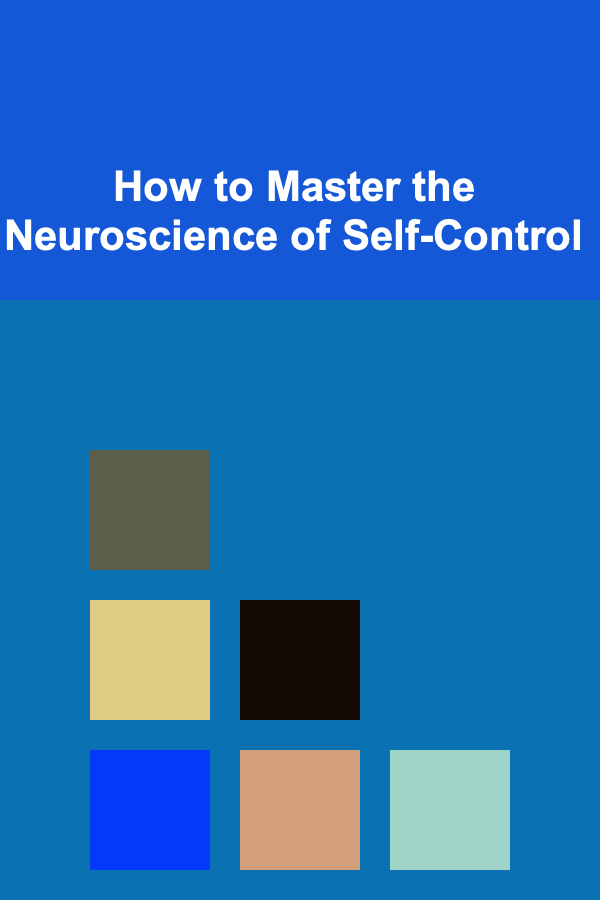
How to Master the Neuroscience of Self-Control
ebook include PDF & Audio bundle (Micro Guide)
$12.99$9.99
Limited Time Offer! Order within the next:

Self-control is one of the most vital skills for personal and professional success. It's the ability to resist immediate temptations, prioritize long-term goals, and consistently make decisions that align with our values and objectives. Whether it's avoiding distractions, sticking to a diet plan, or maintaining productivity at work, mastering self-control is essential for creating a meaningful and disciplined life.
However, self-control isn't merely about willpower or trying harder. The science behind it involves understanding how the brain works, how we make decisions, and how we can train our minds to make better choices. In this article, we'll explore the neuroscience of self-control and provide strategies for mastering it through insights into brain function, cognitive processes, and effective techniques.
Understanding the Neuroscience of Self-Control
To understand how to master self-control, it's crucial first to understand what's happening in the brain when we exercise it. The brain regions involved in self-control are primarily the prefrontal cortex (PFC), which is responsible for decision-making, impulse control, and planning, and the limbic system, which is involved in processing emotions, rewards, and motivations.
1. Prefrontal Cortex: The Executive Function Center
The prefrontal cortex (PFC) is located at the front of the brain and is essential for what are known as executive functions---skills that involve planning, decision-making, impulse control, and regulating behavior. The PFC helps you plan for the future, delay gratification, and inhibit impulses that might not serve long-term goals.
When you resist temptation or stick to a goal despite feeling tempted, it's largely the prefrontal cortex at work. For example, when trying to resist a sugary snack while on a diet, your PFC evaluates the long-term benefits (health, fitness) against the immediate reward (taste, pleasure), helping you make a choice that aligns with your values.
2. The Limbic System: The Brain's Reward System
In contrast to the PFC, the limbic system is responsible for processing emotions and rewards. It includes structures like the amygdala, which is associated with emotions, and the nucleus accumbens, which is a key area of the brain's reward circuit.
The limbic system is the part of the brain that seeks immediate rewards and feelings of pleasure. When you face temptations, it's the limbic system that pushes you toward impulsive actions, such as eating that chocolate cake or scrolling endlessly through social media.
Self-control often involves a tug-of-war between these two brain regions: the PFC, which favors long-term goals and delayed gratification, and the limbic system, which seeks instant rewards. Mastering self-control requires strengthening the PFC while managing the influence of the limbic system.
3. Dopamine: The Motivation Chemical
Dopamine plays a significant role in both motivation and self-control. It's often referred to as the "feel-good" neurotransmitter because it is released when we experience pleasure, such as eating a delicious meal or achieving a goal.
However, dopamine also drives our behavior and motivates us to seek rewards. When we resist short-term temptations in favor of long-term goals, the PFC must manage dopamine's influence to ensure we stay on track. Interestingly, the anticipation of a reward is often more motivating than the reward itself, meaning that dopamine can sometimes work against our self-control.
The Challenge of Self-Control: Ego Depletion
One of the most critical concepts in the neuroscience of self-control is "ego depletion," a theory proposed by psychologist Roy Baumeister. According to this theory, self-control relies on a limited resource. When we exert self-control in one area of our life (e.g., resisting the urge to eat unhealthy foods), this depletes our cognitive resources, making it more difficult to exercise self-control in another area (e.g., staying productive at work).
Ego depletion explains why after a long day of resisting temptations, you may find it harder to stick to your goals in the evening. Your brain's capacity for self-control has been exhausted, and you might give in to temptations more easily.
However, the concept of ego depletion is not without controversy. Some research suggests that self-control might not be as limited as initially thought, and that mental fatigue may be more psychological than physiological. Nevertheless, it remains clear that self-control can be more challenging after prolonged exertion, and understanding how to conserve and replenish self-control is crucial for mastering it.
Strategies for Mastering Self-Control Based on Neuroscience
Mastering self-control requires a multifaceted approach, incorporating strategies that strengthen the brain's self-control networks, reduce the power of impulsive urges, and minimize the depletion of cognitive resources. Here are several evidence-based strategies for improving self-control.
1. Strengthening the Prefrontal Cortex
Since the prefrontal cortex (PFC) is responsible for impulse control and decision-making, strengthening this area can lead to improved self-control. Research has shown that certain activities can enhance PFC functioning:
- Mindfulness Meditation: Regular mindfulness practice has been shown to improve PFC functioning and increase self-control. By becoming more aware of your thoughts and feelings, you can better manage impulses and make more deliberate choices.
- Cognitive Training: Activities like playing chess, learning a new skill, or engaging in complex problem-solving can stimulate the PFC. These activities enhance cognitive control and can translate to better self-control in everyday situations.
- Exercise: Physical exercise has been linked to improvements in executive function, particularly in the PFC. Exercise increases the production of brain-derived neurotrophic factor (BDNF), which promotes the growth of new neurons and strengthens cognitive functions.
2. Creating Healthy Habits and Routines
One of the easiest ways to exert less cognitive effort and conserve self-control resources is to create automatic habits and routines. When behaviors become habitual, they require less decision-making and less self-control to execute.
- Make the Desired Behavior Easy: If you want to make a habit of exercising in the morning, place your workout clothes out the night before. The fewer steps it takes to start the desired activity, the easier it is to follow through.
- Automate Decisions: Try to automate as many decisions as possible so that you don't need to rely on self-control. For instance, you could plan meals in advance or set up automatic savings transfers.
- Start Small: Building habits in small, manageable steps helps to avoid overwhelming your cognitive resources. Start with small commitments that require minimal self-control and gradually build up to larger goals.
3. Delay Gratification: Techniques for Building Self-Control
One key element of self-control is the ability to delay gratification. The longer you can delay the pursuit of immediate rewards, the more likely you are to succeed in achieving your long-term goals. Here are some techniques that can help:
- Use Implementation Intentions: Implementation intentions are "if-then" plans that specify when, where, and how you will carry out a specific goal. For instance, if you're trying to avoid junk food, you could set an intention to eat a healthy snack every time you feel hungry after 3 pm.
- Use the "10-Minute Rule": When facing temptation, tell yourself to wait just 10 minutes before making a decision. Often, the urge will subside, and you'll be able to make a more rational choice.
- Visualization: Visualizing the long-term rewards of your goals can help you delay gratification. For example, visualizing your success in achieving a health goal can reinforce the benefits of sticking to your plan.
4. Managing Dopamine and Reward Systems
Since dopamine drives motivation and the pursuit of rewards, understanding how to manage it can play a significant role in mastering self-control.
- Reward Substitution: Instead of relying on immediate rewards for self-control, consider substituting them with longer-term rewards. For instance, if you resist a sugary snack, reward yourself with something more beneficial, such as a feeling of pride or a small step toward your larger goals.
- Reinforce Delayed Rewards: Dopamine is most effective when the reward is delayed, so try to structure your goals in such a way that you experience the dopamine rush after completing a long-term goal.
- Avoid Overstimulating Dopamine: Engaging in highly stimulating activities, like binge-watching shows or eating unhealthy foods, floods the brain with dopamine, which can desensitize you to it over time. Try to reduce your exposure to immediate, artificial rewards that might make self-control harder in the future.
5. Recovering from Ego Depletion
Since ego depletion is a real challenge, understanding how to recover from it is crucial for long-term self-control.
- Take Breaks: After exerting a lot of self-control, take breaks to recharge. Resting, especially after completing a difficult task, helps to replenish your cognitive resources.
- Practice Self-Compassion: Self-compassion involves treating yourself with kindness and understanding, especially when you make mistakes. Research shows that self-compassion can actually help you get back on track faster after a lapse in self-control.
- Maintain a Balanced Lifestyle: Ensuring you have a good balance of rest, exercise, and nutrition will help maintain cognitive resources and prevent burnout.
6. Understanding the Role of Stress
Stress can undermine self-control by reducing the brain's ability to function optimally. High levels of stress activate the amygdala, which is involved in emotional responses, and can make it more difficult to engage the prefrontal cortex. To protect your self-control abilities, managing stress is vital.
- Practice Stress-Reduction Techniques: Engage in activities such as deep breathing, yoga, or spending time in nature to reduce stress and maintain cognitive function.
- Get Enough Sleep: Sleep is essential for cognitive recovery. Poor sleep can impair the PFC, making self-control more difficult. Prioritize sleep to help improve your self-regulation.
Conclusion
Mastering the neuroscience of self-control is not a one-time event but a lifelong practice. By understanding how the brain works and implementing strategies to strengthen self-control networks, reduce impulsive urges, and manage cognitive depletion, you can improve your ability to resist temptations and make decisions that align with your long-term goals.
Self-control isn't just about saying "no" to temptation---it's about creating an environment where the brain can thrive, making smart choices automatic, and reinforcing behaviors that lead to success. With time, effort, and dedication, you can build the resilience and discipline necessary to navigate life's challenges and achieve your most important aspirations.

How to Deep Clean Your Kitchen for a Healthier Home
Read More
How to Keep Your Rental Property Clean and Well-Maintained
Read More
How to Optimize Your Entryway with Smart Storage Solutions
Read More
Virtual Assistant Success Stories: Real-Life Case Studies
Read More
How to Overcome Performance Anxiety
Read More
Resolving Conflicts Peacefully with Your Partner: A Deep Dive
Read MoreOther Products

How to Deep Clean Your Kitchen for a Healthier Home
Read More
How to Keep Your Rental Property Clean and Well-Maintained
Read More
How to Optimize Your Entryway with Smart Storage Solutions
Read More
Virtual Assistant Success Stories: Real-Life Case Studies
Read More
How to Overcome Performance Anxiety
Read More